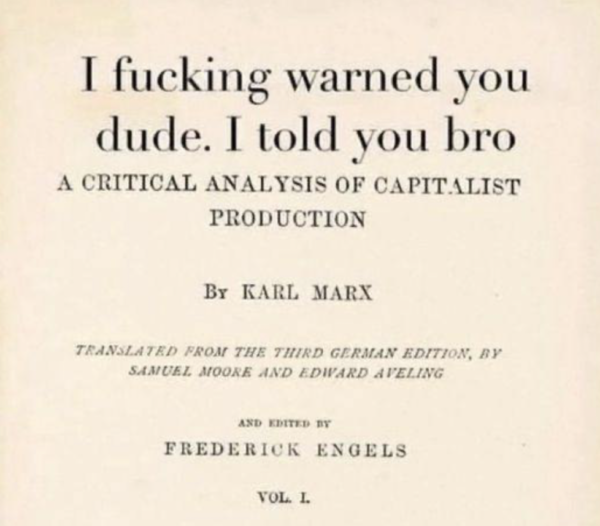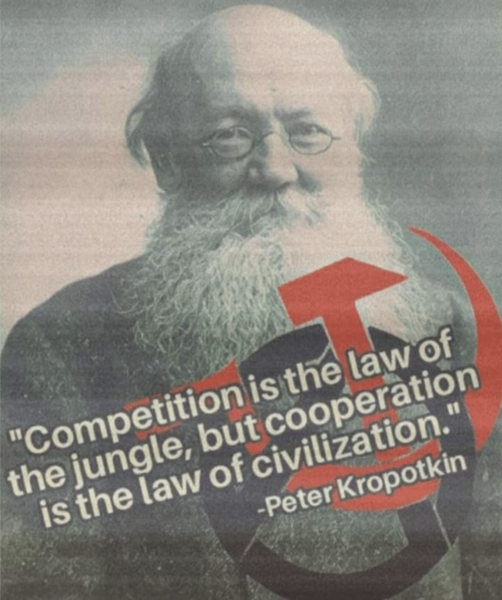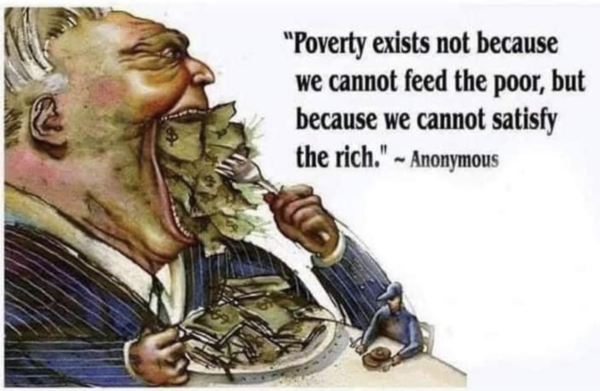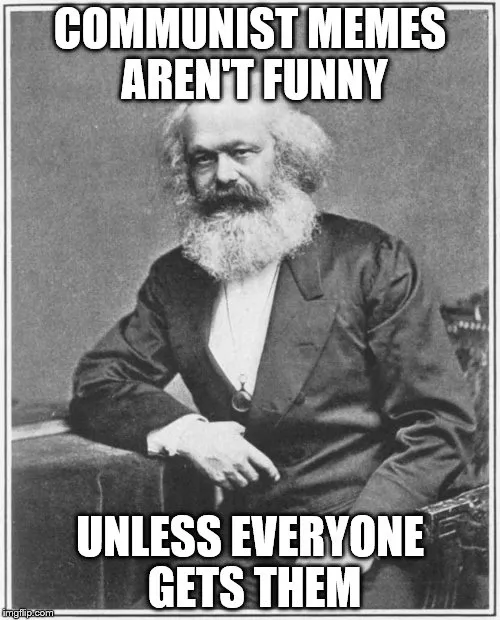Last week I began this three-part series to help understand what is happening to the world economy today and why pro-capitalist economists are completely unable to explain it. Today I look at the conflicting Marxist explanations of the crisis that are common today and why they have departed from Karl Marx’s explanation in “Capital” and it helps if we go back to Marx and his explanation that all crises are generalised crises of overproduction to find a proper understanding of the crisis.
Conflicting crisis theories
Marx had identified the essence of the periodic crises of capitalism as crises of overproduction very early on, even in the Communist Manifesto in 1848. This crisis can only happen because production periodically exceeds monetarily effective demand, which is ultimately determined by the existing size and growth rate of the global hoard of the money commodity – gold.
I am emphasising this because there has been a retreat from this analysis, including among followers of Marx. In fact, the two main schools of Marxist crisis theory today are not schools based on periodic overproduction crises.
One school is based on the primacy of the tendency of the rate of profit to fall (TROPF). Marx introduced this idea in volume 3 of“Capital” as an important long-term historical tendency in capitalism. Marx also pointed out many counter tendencies, but the tendency is true over long periods. Many Marxist economists use that important theory as the primary explanation for why capitalism has crises.
This school of thought is associated with the US academic Andrew Kliman, the prolific blogger Michael Roberts, and British theorists from the Trotskyist tradition including the British Socialist Workers Party (SWP) leader Alex Callinicos. All three writers deserve to be read, and there is much to learn from their writings.
But the almost monomaniacal attachment to the TROPF to explain crises leads them astray.
Michael Roberts even tries to explain the 10-year cycle under capitalism as the result of the fall in the rate of profit. It is, of course, true that every crisis is associated with a fall in the rate of profit, but that temporary decline is a result of the crisis, not the cause.
Callinicos seems unable to explain the real growth of capitalism since the 1980s. Because the early 1980s crisis must have been the result of the TROPF, and since there has been no counter tendency big enough to overcome the falling rate of profit sufficiently, the crisis must be permanent. However, the world economy has more than doubled in size in that period, and we have seen an explosive growth in capitalist production in China, which he fails to properly account for in his theories.
The other significant school of thought is associated with the US Monthly Review magazine and its editor John Bellamy Foster. Foster is an important writer on economic matters for the magazine as well as a leading theorist on the relevance of Marxism to understanding today’s ecological challenges. The Monthly Review school is very influenced by Keynesian ideas. John Maynard Keynes was a pro-capitalist economist who became very influential in the wake of the Great Depression of the 1930s.
Traditional bourgeois economic theory denied that capitalism could have crises. Keynes had been schooled in this theory but, when faced with the crisis of the 1930s, was forced to acknowledge the reality staring him in the face. This was that capitalism can have crises; in fact, it seemed to him to have a tendency towards stagnation. But he believed the state could intervene to alleviate crises, if not eliminate them altogether.
So from a Keynesian point of view, you cannot have a crisis of overproduction. Rather, with Keynes, you have a crisis of under-consumption that can be resolved by the state stepping in to purchase goods directly or printing money to give people to spend themselves and/or using government deficit spending to put more money into the economy. Part of the reason Keynes favoured ending the gold standard was to allow this to happen more easily.
Overproduction as the underlying cause of crises, which is based on Marx’s concept of money as the universal equivalent, has been – especially since the end of what remained of the international gold standard in 1971 – all but forgotten, including by most of those claiming to be Marxist.

Capitalism requires a measure of value that is itself a commodity
Classical political economy represented by Adam Smith and David Ricardo was the science of capitalism. Marx developed and perfected their labour theory of value. Smith’s “invisible hand” — the unobservable market force that helps the demand and supply of goods in a free market to reach equilibrium automatically — was the law of labour value in operation.
But Marx also explained that what Smith and Ricardo called “labour” was actually “labour power” or the ability to work. But a capitalist won’t employ labour unless the worker is able to produce more value in a workday than what they are paid. This “surplus value” is the origin of all forms of profit and drives the invisible hand. This made Marx’s ideas a revolutionary advance on classical political economy and forced the capitalists to abandon the science of political economy.
A central part of Marx’s perfected labour theory of value was that it requires – as does commodity production as a system – a measure of value that is itself a commodity.
Ultimately, gold emerged as the main money commodity because it is durable, contains a significant value (amount of abstract human labour measured in units of time) in a small quantity, and is easily divisible. However, it can only be a measure of value because it has value as a product of labour itself, measured by its monetary use value in units of weight.
The pro-capitalist alternative to that theory and Keynesian under-consumptionism is dubbed Say’s Law – an economic principle of early “vulgar” economics named after the French businessman and economist Jean-Baptiste Say (1767–1832). Marx dubbed them “vulgar” economists because they had ceased to seek a scientific explanation for what was happening and instead provided simple apologies for capitalism and its laws.
Say stated that production creates its own demand. Commodities are bought with commodities. Money plays no particular role except as an intermediary.
This idea, combined with marginalism – the theory that commodities have exchange value because of their scarcity relative to human needs – tries to banish the labour theory of value by claiming things have value due to their marginal utility and that generalised overproduction of commodities is impossible.
Essentially, this is a subjective rather than objective theory of value. Marginalism, which assumes Say’s Law either explicitly or implicitly, was the end of bourgeois economics as any form of science. All bourgeois economics today is built on these two false theories and can’t escape them.
The abolition of the gold standard has created very real problems with the modern US dollar-based international monetary system, with permanent inflation, regular exchange rate crises, and so on. Following the Bretton Woods monetary conference in 1944 up to 1971, when Nixon took the dollar off the gold standard, money in everyday use nearly always had a legally fixed relationship to gold via the US dollar.
You could go to a central bank and demand a certain amount of dollars for your currency, which in turn would represent a specific amount of gold, backed by the bullion hoard in Fort Knox.
Prior to 1933, individuals, as well as countries, could demand gold for their paper US dollars. After 1933, up to 1971, foreign governments and their central banks – but not individuals – could do the same.
But after the gold standard was completely abandoned, there was an assumption on the part of many Marxist economists that maybe Keynes was right on one point. Maybe now you could just create money at will. The state had the power not just to create tokens representing gold but create currency at will with no relationship to gold – now supposedly “just another commodity” like all others with no special role.
That is a big mistake. Ultimately, all non-commodity money – token money and credit money – must have a relationship to a real money commodity like gold. This is true whether a formal gold standard exists or not. This lawful economic relationship still exists and therefore continues to be the underlying cause of crises of overproduction.
When they started to print money at will, in the 1970s, when Nixon said, “We are all Keynesians now”, what you ended up with was a severe bout of inflation as printed money lost value and its fixed relationship to the money commodity, which remained gold.
The “price” of gold surged – that is, it took more and more tokens to represent the same amount of gold. Monetary tokens were being devalued, and inflation was the inevitable result.
Engels (and Marx) on overproduction crises
The nature of a crisis as an overproduction crisis was spelt out by Engels in 1873.
Engels was a remarkable man. He worked managing his family business in Manchester for some decades, operating as a capitalist in the textile trade. He did that so he could keep his friend and intellectual partner free to work on “Capital”. He hated what he did.
Engels was a brilliant man, but he knew there was one person – Karl Marx – who alone at that time was both willing and able to carry through the critique of bourgeois political economy. Engels was willing to do whatever was necessary to enable Marx to work. The correspondence of Marx and Engels is extraordinarily rich in political and economic analysis.
Engels begged Marx to get on with the task of writing the book. Marx promised again and again that it was just around the corner. There came a certain point in his life when Engels could give the business up, and there is a wonderful letter where he expressed his joy at being liberated from his role as an industrial capitalist.
Engels did a lot of writing in defence of the joint views of Marx and Engels. One of his major works was a polemical work in 1877 called “Anti-Duhring” against a then fashionable but now obscure German professor. It became an exposition of the mature views of Marx and Engels on a broad range of political, historical, philosophical, and economic ideas.
By this time, all of Marx’s major economic concepts had been developed. He even wrote a chapter of “Anti-Duhring” himself. For those attached to the TROPF, it is not mentioned once as a cause of crises. However, they did write an important paragraph summarising their joint views on the origin of crises under capitalism. It reads:
We have seen that the ever-increasing perfectibility of modern machinery is, by the anarchy of social production, turned into a compulsory law that forces the individual industrial capitalist always to improve his machinery, always to increase its productive force.
The bare possibility of extending the field of production is transformed for him into a similarly compulsory law.
The enormous expansive force of modern industry, compared with which that of gases is mere child’s play, appears to us now as a necessity for expansion, both qualitative and quantitative, that laughs at all resistance.
Such resistance is offered by consumption, by sales, by the markets for the products of modern industry.
But the capacity for extension, extensive and intensive, of the markets is primarily governed by quite different laws that work much less energetically. (Emphasis added)
The extension of the markets cannot keep pace with the extension of production.
The collision becomes inevitable, and as this cannot produce any real solution so long as it does not break in pieces the capitalist mode of production, the collisions become periodic.
Capitalist production has begotten another “vicious circle”.
The problem is Engels didn’t spell out what these laws are that govern the capacity for growth of the markets and why they work much less energetically.
But he spells out that he sees the cycles of capitalism and the crises they produce as a periodic collision of two counterposed forces—the physical ability of capitalism to use modern science and technology to expand production without limit, and the different, less energetic laws governing the growth of the markets.

Laws governing the growth of markets
The laws that govern the growth of markets are connected to the role of the money commodity as a measure of value and periodic changes in the relative profitability of gold production versus the production of other commodities.
Gold is both the universal equivalent, the measure of value, and a commodity in its own right. Therefore, its production remains key to understanding the laws of capitalism that determine value, price, and profit.
But if you look at the history of capitalism, there is a peculiarity about gold. Because it is the ultimate measure of value, the production of gold tends to move countercyclically to overall commodity production. So, when there is an overall boom in production in society, gold production tends to decline, and during overall depressions in society, gold production tends to increase. This is an important mechanism for regulating capitalism.
As prices in gold terms (in weights of gold) rise during the rising phase of the industrial cycle, gold’s purchasing power falls, gold production becomes relatively less profitable, and capital flows out of that sector, gold production slows, interest rates rise as money becomes tight, and the boom ends in a crash.
When prices in gold terms fall sharply in a crisis, gold’s purchasing power rises, gold production becomes relatively more profitable, and capital flows into the sector causing gold production to rise, adding to the growing idle money hoard resulting from the crisis itself, pushing down interest rates, and the economy recovers.
The capitalist system seeks to escape the limits of monetarily effective demand by, as Marx explained some 150 years ago, expanding credit. But credit cannot expand forever, even with all the modern-day miracles performed by today’s computers. In the end, the debt must be serviced—interest and principal paid—and eventually, the game is up. Interest rates rise during the industrial cycle’s boom (overproduction) phase, credit collapses, and another crisis is born.






This world is like a pendulum, it swings from one extreme to equilibrium momentarily into another extreme, and back again. This can be seen in all aspect, whether climate, social, economical, fiscal, cultural or moral values.
Uncontrolled capitalism creates accumulation of wealth, in a minority group, via profits from sales of items that is deemed desirable via marketing.
In ideal world there will be no billionaires, and no – super multi -millionaires. There should be huge wealth tax e.g 70% over $50m+, including non govt/ non council company assets if they are non productive assets. I say $50m as a guide, as people ought to be able to enjoy fruits of their labour, without the state putting its greedy fingers on it.
The current government is fixated on taxing income, and penalising any aspirations for betterment. Yes, salaries ought to be regulated, e.g. the wage gap between lowest and highest paid can not be more 10x. Some might say why can’t a cleaner be paid same as a CEO. Try it…and see how many qualified applicants you get for a CEO. Feel free to hire a candidate with year 11 ncea as CEO in your multi million dollar company.
In my view, income tax should be halved, and excessive wealth over certain amount ought to be targeted. This will ensure people have incentives and aspirations to better the lives of themselves and family. At the same time wealth accumulation does not become a problem for the society.
You are correct with the pendulum theory .When I worked as a builders labourer in Sydney the in ion ruled with an iron fist and made demands that were embarrassing just to prove they could . Later I worked in Darwin no union allowed and the bosses word was final and I was expected to do some dangerous jobs just because they could .
There is often no happy medium for the worker and as I grew older I tried to work without needing unions and choosing a boss that respected me and my effort.
Re;’The invisible hand’
I believe Adam Smith is often misquoted and not used in relevant context.
some points: Adam Smith was NOT an economist. He was a philosopher and taught philosophy. Generations later he is called ‘The Father of Capitalism”. He is long dead so we cannot know if that is title he wanted.
I have read Adam Smith( like Marx a major mission) As I understand it the ‘Invisible Hand’ is like this example:
A British manufacturer may be able to move his manufacturing plant to France for lower wages and closer access to European markets.
The manufacturer does not do so because his family ties and his ties with employees and customers are all in Britain and he feels comfortable with them.
So this “Invisible Hand’ is the total opposite of what modern corporates do when they relocate to exploit low wage workers in Third World countries.
Smith also stated wealthy people should pay more tax than poor people(no fucking tax cuts for rich pricks).
He also stated private enterprise could not provide all the services people need and the state should provide postal services, roading and intervene in economic matters to maintain the well being and security of the realm as a whole.
I cannot recall that he wrote anything about wealth ‘trickling down’ from rich to poor.
Is there an alternative universe’s heaven where Adam Smith is repeatedly slapping Milton Friedman ‘Knave and Poltroon. Thou hast used my name as a cloak for your vile philosophy.’
Karl Marx is kicking Stalin in the balls. ” Did I say one fucking word about Gulags?’
Jesus Christ is lashing millstones to assorted Christian clergy before dropping them into the ocean. ” suffer little children to come unto me means you PROTECT them from harm.” ( For me’s sake!).
Scarlett O’Hara is scrubbing floors, washing laundry, cooking meals and making beds for her black mistress Aunt Jemima.
It is a shame that all this intellectualism, intellectual grunt goes to waste.
Amene.
Earlier economists and Adam Smith did not forsee the explosion of futures,derivatives CDO’s and Q.E.
These are the harbingers of doom.Putin is right…real commodities will prevail over financial …chicanery…eventually.
I think it is very ironic in a sense because communism may rise in New Zealand, due to post pandemic economic woes, etc, at a time when National get into power next. How will they handle the different fallouts, protests, etc, if that phenomenon does occur? It’s certainly not an out of the ordinary thing to have happen in a country. Think about the British music revolution of the sixties, for example, and how that contrasted, at least initially, with the established aristocratic class.
Energy pulse – classical economics is about to go out the window. All of this has been on the back of cheaper and more abundant forms of energy being available to offset debt and future calls on production, until now. Humanity is in for a big down slope.